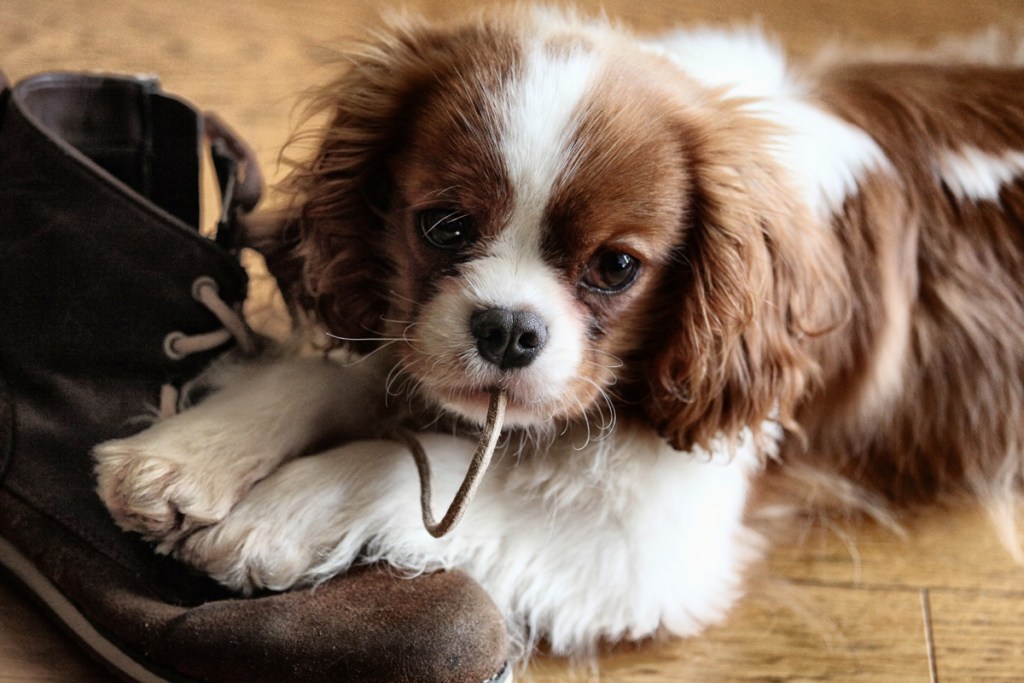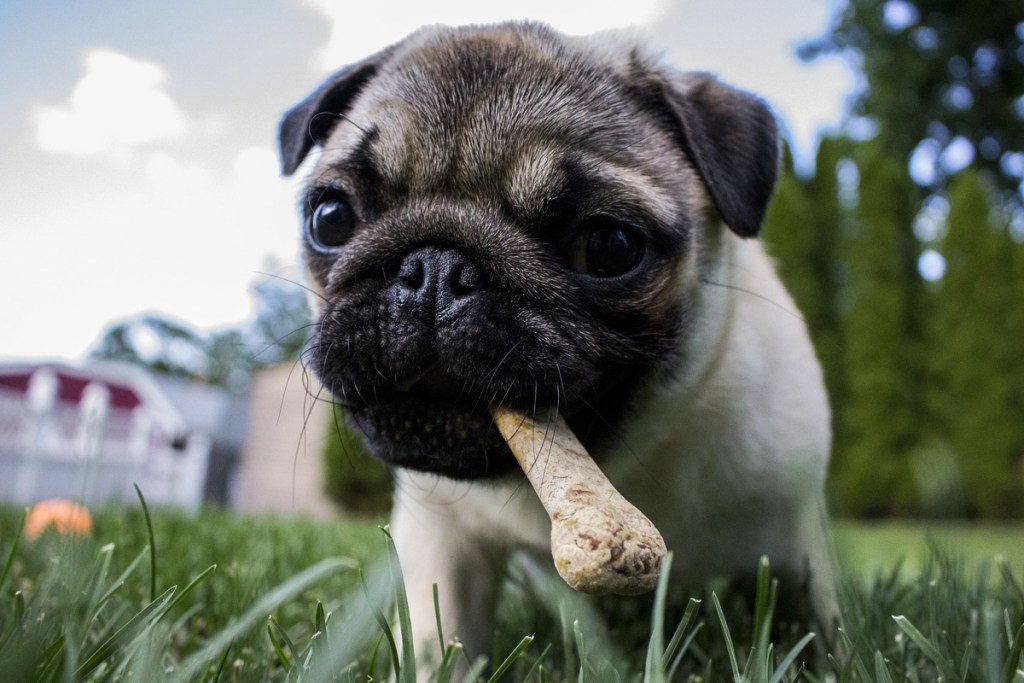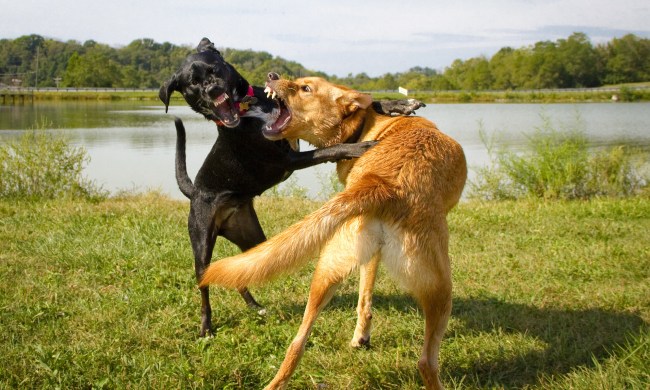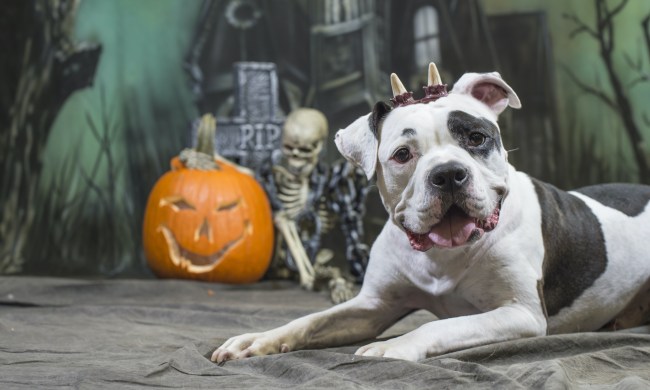Visit any home blessed with a puppy, and you’re likely to see table and chair legs that have been gnawed, a TV remote with teeth marks, or slippers with holes. When it comes to housebreaking puppies, it’s not just about toilet training. Your four-legged baby also needs to learn not to chew everything in sight. This is normal behavior for puppies, especially when they are teething, and chewing helps relieve painful gums. The key to peaceful coexistence is to find positive ways to prevent this destructive behavior.
How do I get my dog to stop chewing and eating everything?
Supervise your puppy
Your puppy needs to be supervised when not confined, as it takes only a few seconds for her to get into trouble. Training experts recommend keeping young puppies on a leash when moving around the house. This both helps with toilet training and prevents inappropriate chewing.
Confine your puppy when you can’t pay attention
Confine your puppy in a crate when you can’t watch her. Other options include a pen enclosure or gating off a small puppy-proofed area in your home. Give your puppy a chew toy to keep her busy when alone. Never use confinement as a form of punishment; it should be a space where your dog feels safe.
Keep items out of reach
To protect your belongings — and for your puppy’s safety — remove all household items that are within your puppy’s reach. Typical targets for puppy chewing include socks, shoes, slippers, TV remotes, plants, purses, wallets, supplements, eyeglasses, books, and children’s toys. An unattended laundry basket full of clothing is a wonderful discovery for a puppy.

Use a deterrent spray to protect furniture
When everything else of interest has been removed, puppies won’t hesitate to chew on furniture. The legs of tables or chairs — even couch upholstery — are a common target. You can discourage this behavior by using a spray deterrent such as Bitter Apple.
Give your puppy appropriate chew toys
Some pet parents give their pups old shoes, slippers, or socks as toys. This is a mistake, say training experts at the Humane Society of the United States. It’s confusing for your dog since she can’t distinguish between which shoes and socks she can chew and which are off-limits. Instead, provide her with dog toys. Offering a frozen rubber toy such as a Kong can help soothe a teething pup’s gums.
Comfort her by leaving your scent when she has to be alone
Experts at PetMD recommend rubbing your hand over your puppy’s chew toys before leaving her alone. Smelling your scent can help soothe any tendencies toward separation anxiety, which can lead to destructive chewing.
Teach your dog what it’s OK to chew
If you see your puppy chewing on furniture, say something like “oops” and then use a command such as “leave it.” As soon as she stops and looks at you, give her a treat and lots of praise. If she has something in her mouth that she shouldn’t have, say “drop it” and give her the treat as soon as she obeys. Be sure to redirect your dog to an appropriate chew toy. Never chase after her when she grabs something inappropriate as she will think you’re playing. Instead, call her to you and use the treat exchange method to get her to give up the item.
At what age do dogs stop chewing?
It’s the need to investigate interesting objects and the discomfort of teething that cause puppies to chew so much. Typically, by 6 months of age, a puppy’s baby teeth have fallen out and her adult teeth have grown in, according to the American Kennel Club. While much of the destructive chewing will end around this time, remember that your dog will still enjoy normal chewing. In addition to providing stimulation, chewing helps strengthen a dog’s jaws and clean her teeth. Be sure to have a selection of safe toys on hand for your growing dog.

What causes excessive chewing in dogs?
Dogs who don’t get enough exercise or are left alone too much can resort to excessive chewing to relieve boredom and stress. You can offer mental stimulation by providing at least two walks a day along with short play and training sessions. Dogs who suffer from separation anxiety may also resort to excessive chewing. Hiring a dog walker to take your buddy on midday adventures can help with this problem. Be sure to provide your dog with a favorite chew toy when home alone. Also, playing soft background music can be calming for some dogs. In severe cases, your veterinarian may recommend calming supplements or medications.
While it’s easy to get frustrated when your puppy engages in destructive chewing, avoid getting angry. Punishing, scolding, or roughly pulling items from a dog’s mouth can have negative consequences. Instead, remain calm and use positive-motivation training to get your dog to give up the object and then redirect her to a chew toy. It takes time and patience and lots of reinforcement, but in the end, you can enjoy quality time with your dog without worrying about destructive chewing.



